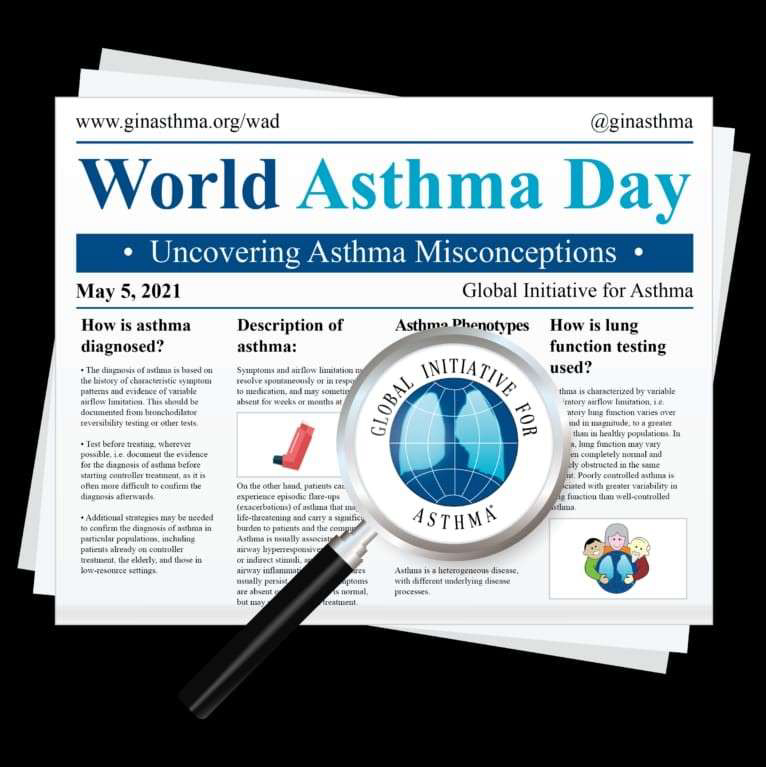
Asthma can occur at any age, yet it does not appear to be a relatively solid risk factor for getting COVID-19, however, poorly controlled asthma can lead to more serious illness for those who contract COVID-19. According to the American College of Allergy, Asthma & Immunology (ACAAI), patients who have severe asthma and other chronic conditions where their immune system is compromised are most vulnerable to increased sickness and mortality from viral infections in general, and similar precautions should be recommended to these individuals for COVID-19 as well.
The World Health Organization (WHO) recognizes that asthma is of major public health importance, and according to a 2016 survey by WHO, it is estimated that more than 339 million people had asthma globally. Although asthma cannot be cured, it is possible to manage to reduce and prevent asthma attacks, also called episodes or exacerbations. And to raise awareness about asthma and to burst the myths related to it, World Asthma Day (WAD) is celebrated every year. It is organized by the Global Initiative for Asthma (GINA), which was founded in 1993, as a collaborative organization by WHO. WAD is held on each 4th May to raise awareness about Asthma on a global platform. And the World Asthma Day theme for 2021 is “Uncovering Asthma Misconceptions”. This theme provides a route to action to tackle regularly carried myths and misconceptions regarding asthma that stop individuals with asthma from having the best possible help from the most important developments in managing this condition.
In a time when we are dealing with a global pandemic like COVID-19, there are many false reports and measures related to COVID-19 that is creating panic among the people, and it specifically expands the fear of patients who are already going through an illness like asthma. However, people with asthma should take precautions when any type of respiratory illness like COVID-19 is spreading in their region. And if all the precautions are taken cautiously and regularly there is no need to panic about the situation. A few key precautions which should be taken by asthma patients in COVID-19 are also given below.
- Take all your asthma medications only as directed and follow an action plan:
Uncontrolled asthma is a very serious health threat for patients with asthma, and they should continue to take all the asthma medications. These medications can include rescue inhalers, steroid inhalers, steroid pills, and biologics as directed by their doctor. According to Centers for Disease Control and Prevention (CDC), people should also follow an asthma action plan in these times. An asthma action plan is a personalized plan that people can follow to control their asthma and prevent any triggered asthma attacks. Having a good supply of asthma medication, knowing how to use an inhaler properly, resulting steps to reduce stress and anxiety can be important parts of any asthma action plan.
- Stay attentive about your inhalers:
People with asthma are provided with steroid inhalers to keep their asthma under control. And in this COVID-19 pandemic, the best thing a person with asthma can do is to keep their asthma under control. An article in the Journal of Allergy and Clinical Immunology has prevented the use of nebulizers unless it’s very necessary. And this is because a nebulizer can increase the risk of sending virus particles in the air, potentially transmitting the virus to others nearby. However, patients with asthma should never stop taking their steroid inhalers unless asked to do by their doctor.
- Avoid your asthma triggers:
Asthma has many triggering aspects which can have a severe impact on the health of asthma patients. According to National Asthma Council of Australia, some very common and potential asthma triggers include dust mites, pollen, pets, tobacco smoke, exercise, acid reflux, strong fragrances, alcohol or food additives, stress, and weather extremes. Avoiding the asthma triggers can put a person at risk for developing an asthma exacerbation. In the COVID-19 pandemic, the treatment of an exacerbation will likely require going to the hospital, where the asthma patient has a much higher risk of being exposed to someone with a COVID-19 infection.
- Must follow regular COVID-19 precautions:
For asthma patients, following all the COVID-19 precautions are extremely important. These precautions include things like washing hands frequently with soap and water, using alcohol-based hand sanitizer, avoiding touching the nose, eyes, and mouth with unwashed hands, covering your mouth and nose, avoiding touching surfaces others have touched, and avoiding contact with ill people, particularly from people who have any type of COVID-19 symptoms like a fever, or a cough, and all other symptoms too. Cleaning and disinfecting the surroundings like tables and door handles is also very important in these situations.
- Adopt some healthy habits:
Nowadays, every person needs a healthy immune system to fight any type of infection, particularly for COVID-19. Adopting some healthy habits can help strengthen the immune system, and it can support preventing the virus. Following habits like trying for at least 7-8 hours’ sleep per night, reducing stress levels, and looking after your mental health as much as possible, eating a diet rich in fruits and vegetables, exercising regularly, and maintaining a healthy weight can help to stand against the virus.
________________________________________
Reference:
- www.cdc.gov
- www.aafa.org
- www.medicalnewstoday.com
- www.ginasthma.org
